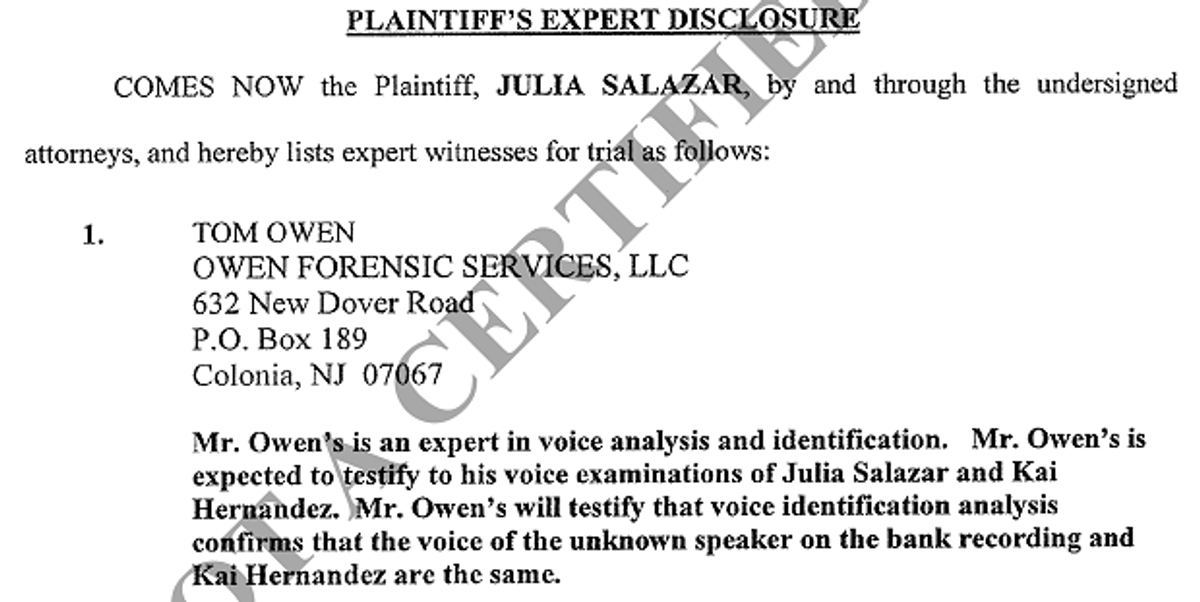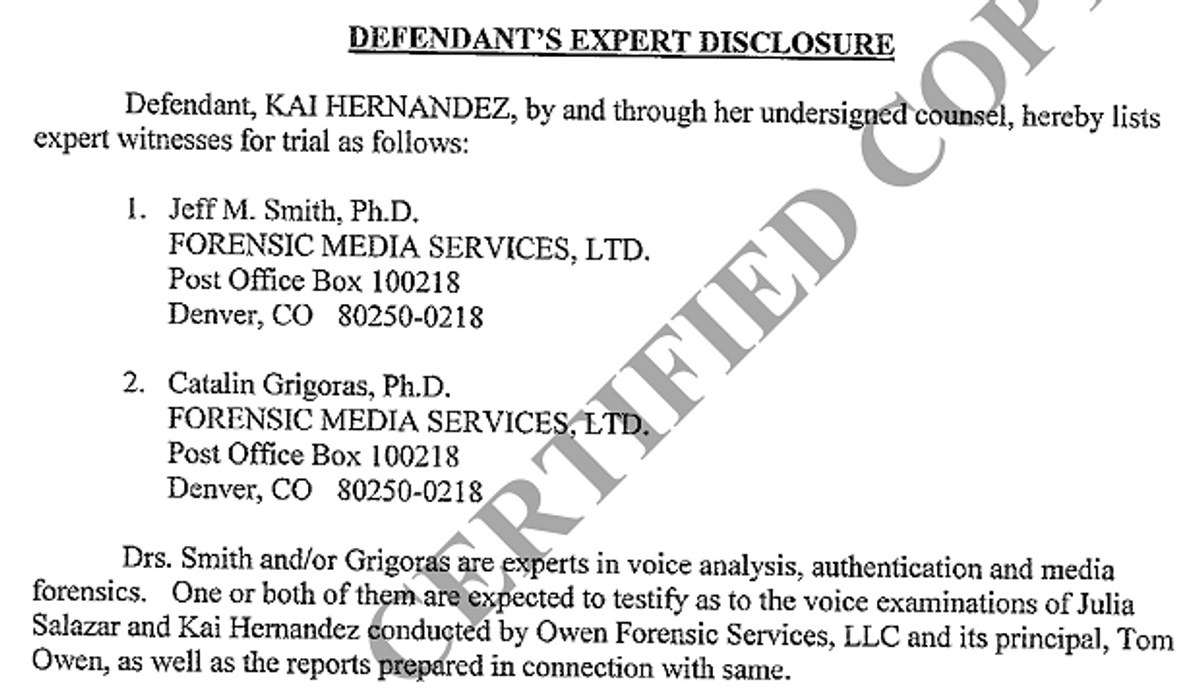State Senate Candidate Was Arrested in 2011 on Suspicion of Criminal Use of Personal Information
Police reports describe Julia Salazar attempting to impersonate Kai Hernandez, a family friend and then-wife of baseball star Keith Hernandez




Julia Salazar, the Democratic Socialist candidate running for New York state Senate, was arrested in 2011 on allegations of fraudulently attempting to access the bank account of Kai Hernandez, a family friend and then-wife of baseball star Keith Hernandez. The incident is chronicled in police reports, court records, and audio files, all of which have been obtained by Tablet. The key evidence: phone call recordings made by UBS Bank of an individual posing as Ms. Hernandez in an effort to access her account. Despite the arrest, she was ultimately not charged.
On Dec. 14, 2010, after being played the recordings by her banker, Kai Hernandez said she recognized Salazar as the voice on the phone and subsequently filed a police report. Charles Weinblatt, the Tequesta, Florida, Police Department detective assigned to the case, interviewed Salazar on March 23, 2011, and immediately identified her as the speaker on the calls, placing her under arrest. This week, he reaffirmed his conclusion that Salazar was the perpetrator, in an interview with Tablet.
Tablet has acquired the recording of the calls made to the bank, allegedly by Salazar, and they are reproduced in the story below, with sensitive information redacted.
Requests for comment on Salazar’s arrest history were sent early this morning to both Salazar’s campaign address and her deputy campaign manager. Email tracking software indicates that both requests were read multiple times within an hour of receipt, and in the hours following, but no response was received.*
***
On Dec. 14, 2010, Kai Thompson Hernandez received a phone call from her financial adviser at UBS, Mark Zeller. He informed her that earlier that day, an unknown caller had repeatedly attempted to access her account. As Detective Charles Weinblatt recounts in his arrest report, in the first call, the caller correctly provided Hernandez’s date of birth, the last four digits of her social security number, her UBS account number, and UBS Online Services user name. With this information, the caller was able to add another email address to the account, and receive a new temporary password there.
According to the police report, approximately 40 minutes later, the individual claiming to be Hernandez again called UBS, this time asserting that she could not log in to her account because she had been stymied by its security questions. The caller said she had plugged in where she had gone to high school, but the answer had not been accepted by the system. The UBS service representative then transferred the call to one of Hernandez’s financial advisers for the purposes of positive identification—following which the caller abruptly hung up
Some 10 minutes later, per the report, UBS received another call from the same individual, again claiming she was having trouble accessing her account. The call was again transferred to the financial adviser, and again the individual terminated the call.
An hour later, the police record states that Hernandez received a call from Zeller, who played the recorded calls for her. Hernandez verified that she had not made them, and also that she recognized the voice of the person who did. Two days later, she filed a report at the Tequesta Police Department, in which she named Julia Salazar as the perpetrator. Hernandez testified that she had been a close friend of Salazar’s mother, Christine, and had known Julia since she was 9. Julia had house-sat for Hernandez on several occasions, including for the entire month of September 2010, which Hernandez said would have given her access to the personal information used in the bank calls.
“Julia identified herself as me and rattled off my personal information without any hesitation,” Hernandez said in her sworn statement to the police on Dec. 16. “If she had only known the name of my high school, she would have had complete and unobstructed access to my financial information.”
Several months later, when Salazar was back in Florida on break from Columbia University, she was called into the Tequesta Police Department, where—after listening to her speak in an interview—Weinblatt came to believe she was indeed the fraudulent caller, and arrested her. Salazar was fingerprinted and had her mugshot taken. “On today’s date (3/23/11),” Weinblatt wrote in the arrest report, “I interviewed the Def. at PD. I also was immediately able to determine that the voice on the three taped conversations was that of the Def.”
“Based on the facts herein,” he closed, “your affiant believes probable cause exists to charge the Def. with Criminal Use of Personal Information.” Weinblatt, a 23-year veteran of the Tequesta police who retired in 2016, reaffirmed this conclusion to Tablet. “I arrested her, so obviously I felt like I had enough probable cause to prove a case,” he said this week.

Ultimately, Salazar was not charged, likely because “a voice ID is not enough for the state attorney’s office,” said Weinblatt. “There may have been sufficient evidence to arrest her, but the state attorney’s office felt that there was not a likelihood of conviction based on a voice ID, I would assume, so the charges were not filed.” (The state attorney at the time, Michael F. McAuliffe, could not be reached for comment at press time.) In addition, no money had been stolen, since the caller had not been able to access Hernandez’s account, likely reducing the priority and urgency of the case. Salazar later returned to Columbia University.
***
Ironically, the only reason Salazar’s arrest survives in the public record is because of Salazar herself. The Tequesta Police Department is small, and does not typically retain such records beyond a five-year period. Today, the department can find no files or documentation related to the Salazar case. But in March 2013, two years after the incident, Salazar sued Kai Hernandez for defamation in Palm Beach County’s Fifteenth Judicial Circuit. As evidence, she provided both the original police report filed by Hernandez and the arrest report filed by Weinblatt, thus preserving the documents in the public record.
Salazar alleged that the 46-year-old Hernandez, acting in malice, had actually impersonated the 19-year-old Salazar on the phone to her own bank, setting in motion the arrest that had since marred Julia’s emotional and professional well-being. Salazar denied any wrongdoing.
The claimed conspiracy, as noted by the first judge assigned to the case in a hearing, was quite novel. In Salazar’s final version of the events, Hernandez had (a) called her own bank, (b) imitated Salazar’s voice, (c) created a new password, (d) deliberately flubbed a security question, (e) waited for the bank to call her with the recordings of her own calls, and then (f) gone to the police with her meticulously self-manufactured evidence. Both sides retained voice analysts to support their contentions.


After her initial complaint was dismissed, Salazar amended it and made several other allegations against Hernandez, including claiming that Kai had told the police that Julia was having an affair with her husband Keith. No such statement appears in the police reports, though Weinblatt’s recollection is ambiguous. “Something like that sounds vaguely familiar because there was some back and forth, but I can’t specifically say I recall that,” he said. “The only thing I can say is that the arrest was not predicated on the fact of what Kai Hernandez said, beyond leading to Salazar, and then me making the identification by voice… probable cause had to be developed against Salazar, not just based on what Hernandez said.”
The defamation suit dragged on for four years, and was set to go to jury trial in May 2017, when it was finally settled in March. Hernandez had been battling cancer and autoimmune disease, and could not afford to continue the process. Her insurance handled the payout. Lynne Ventry, Hernandez’s lawyer, told me, “if Kai hadn’t gotten ill, we could have tried this case and won this case, I truly believe that, but there comes the cost of her health, and her situation was such that if they’re [the insurance] gonna pay her money, let them pay her money.” She added, “I truly believe she [Salazar] is the voice on that call.” In a statement to The Daily Mail that went live as this piece went to press, Salazar’s lawyer Adam Hecht said about the suit, “Kai Hernandez’s bizarre and fraudulent attempts to defame and victimize Julia were recognized as baseless by the authorities, who declined to file charges, and this matter was resolved with a monetary settlement in Julia’s favor. We have no further comment on this.”
Why did Salazar go to such lengths in this case? The first version of her complaint, before she amended it to include other personal allegations involving Kai and Keith Hernandez, offers a clue:
Plaintiff was humiliated by being handcuffed, being finger-printed, and having to pose for mug shots, which are still public record and accessible through the internet and via other means…
Plaintiff has suffered and will continue to suffer in the future impairment of reputation, health, shame, humiliation, mental anguish, hurt feelings, aggravation or activation of an existing condition, medical expenses, lost earnings and lost earning capacity.
Ventry agreed that reputational impact appeared to be a prime motivator for Salazar. “I think she got herself in too deep, to be honest with you,” she said. “I think she was upset because when you Googled her name, her mugshot came up, and she was all freaked out … She was just bent out of shape because it was showing up and it was affecting her reputation.”
Whether intended or not, the suit also had the effect of suppressing public discussion of Salazar’s arrest. During the reporting of this piece, multiple sources familiar with the case declined to go on the record, citing a fear of litigation. Hernandez herself likewise refused to comment for the piece.
Meanwhile, one year after settling the suit, Salazar filed papers to become a candidate for state Senate in New York.
***
Thanks to the populist insurgency in today’s Democratic politics, from New York’s Alexandria Ocasio-Cortez to Florida’s Andrew Gillum, Salazar’s campaign has drawn outsize attention as a potential progressive harbinger. She has campaigned with and been endorsed by New York’s leading leftist lights: Gubernatorial candidate Cynthia Nixon, attorney general candidate Zephyr Teachout, and Ocasio-Cortez herself. With that attention, however, has come media scrutiny—and that scrutiny has revealed Salazar’s repeated efforts to obscure and even fabricate her past.
In a report last month, Tablet’s Armin Rosen documented how, although Salazar had described herself as a Colombian immigrant in multiple public fora, she was actually born in Miami to a naturalized Colombian father and an American mother. (Profiles in both New York Magazine and The Intercept similarly mischaracterized her as an immigrant.) Additionally, while Salazar has repeatedly claimed that she grew up “working class,” her brother Alex told City & State, “We were very much middle class. We had a house in Jupiter along the river, it was in a beautiful neighborhood.” Salazar’s mother bought used cars for both Julia and her brother, and covered her daughter’s insurance until she was 18. Finally, Salazar’s transformation at Columbia from a right-wing Christian pro-life and pro-Israel activist to an anti-Zionist socialist Jew, which she did not initially disclose during her campaign, has likewise provoked intense debate.
As Ben Adler and Zach Williams of City & State put it, “Overall, Salazar seems to have a penchant for using even tenuous claims to belonging to several historically oppressed groups for maximum political leverage.” On top of all this, a New York Times report published on Wednesday found that Salazar had not actually graduated Columbia University, despite her campaign implying that she did on her website and to reporters.
So she has neither a birth certificate from Colombia, nor a diploma from Columbia?
— (((kweansmom))) (@kweansmom) September 6, 2018
For her part, Salazar has attacked journalists who have exposed her past. After Rosen published his report in Tablet, Salazar accused Tablet of practicing “race science” and claimed that he had deceived her brother on the phone, when in fact Rosen had clearly identified himself and his publication.
Since then, Alex Salazar has apparently fallen for the same deception several times, as he has repeated his refutations of Julia’s biographical claims to reporters at the New York Times, City & State and Vox.
***
The Democratic primary for New York state Senate District 18 will take place on Sept. 13. Salazar has spent the last several months telling its voters an inspiring story about a working class immigrant who worked her way through college while standing up for the oppressed. A different story emerges from allegations made by Kai Hernandez and the police records, court documents, and recent journalism surrounding Salazar.
In just over a week, New York voters will decide which of these two vivid and remarkable stories they find more compelling.
***
* After publication, we received the following statement from Adam Hecht, a lawyer for Julia Salazar: “Kai Hernandez’s bizarre and fraudulent attempts to defame and victimize Julia were recognized as baseless by the authorities, who declined to file charges, and this matter was resolved with a monetary settlement of $20,000 in Julia’s favor.”
***
You can help support Tablet’s unique brand of Jewish journalism. Click here to donate today.
Yair Rosenberg is a senior writer at Tablet. Subscribe to his newsletter, listen to his music, and follow him on Twitter and Facebook.